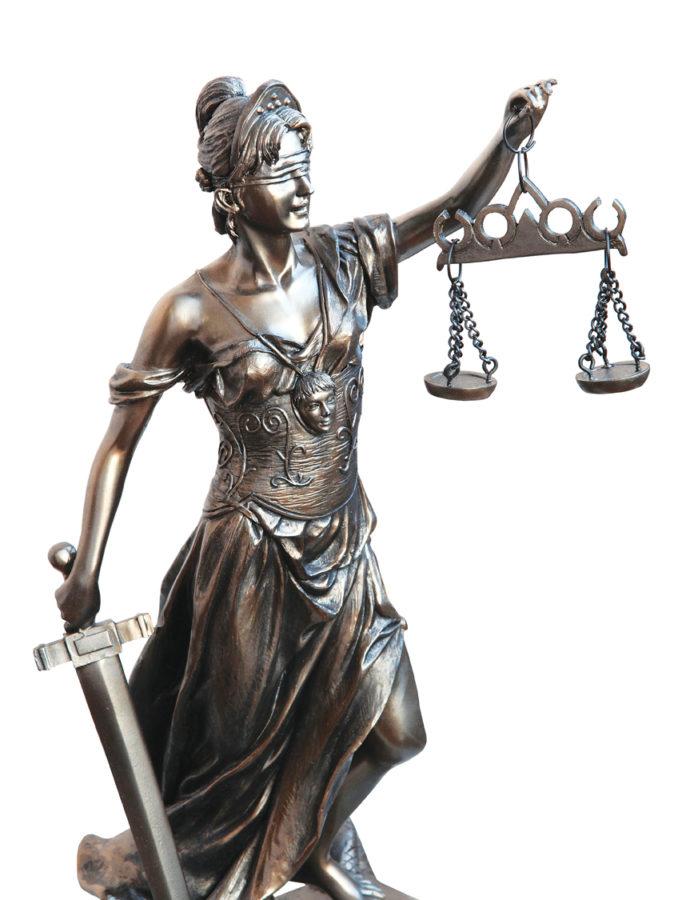Belding: Judges’ removal from office poses threat to our rights
Lady of Justice
November 15, 2010
Two weeks ago Iowans voted to remove three of their seven Supreme Court judges from office. They did so in what is ordinarily a routine, unpolitical retention vote.
These judges were removed largely because their court ruled unanimously that Iowa’s definition of marriage as between a man and a woman was unconstitutional. The result of this section of the ballot is the most disturbing result of last week’s elections.
The judiciary is decidedly not a political branch of government. The people of Iowa failed to separate questions of competence in constitutional analysis and political acts of legislation and exposed themselves to outright mob despotism.
The courts themselves have held in their opinions — specifically in Baker v. Carr in 1962 — that they do not exist as instruments of policy. Rather, our Supreme Courts are arbiters of constitutionality. The state and federal constitutions are not legal codes, detailing crimes and fixing punishments. Constitutions simply create the institutions of government and define their powers. They are the documents that constitute a state. Appellate courts exist so the policy-making executive and legislative departments do not exceed their defined limits or intrude upon guaranteed freedoms.
The power of the judiciary, Bob Vander Plaats and Iowa for Freedom notwithstanding, is one of negation. In matters of constitutionality, such as that in Varnum v. Brien, the courts may only declare law invalid. It cannot be remade, and was not remade. And it is entirely right that this is the case. Laws which contradict the Constitution cannot be valid. Alexander Hamilton, writing in Federalist No. 81, stated that “the Constitution ought to be the standard of construction for the laws, and that wherever there is an evident opposition, the laws ought to give place to the Constitution.”
In an earlier Federalist essay, No. 78, Hamilton wrote, “that every act of a delegated authority, contrary to the tenor of the commission under which it is exercised, is void. No legislative act, therefore, contrary to the Constitution, can be valid.” Hamilton continued, writing, “The interpretation of the laws is the proper and peculiar province of the courts.” In interpreting the Constitution, the members of the Iowa Supreme Court did as they were supposed to do.
In politicizing the judiciary, we expose ourselves to threats to our constitutional rights. In Federalist No. 78, Hamilton wrote, “that though individual oppression may now and then proceed from the courts of justice, the general liberty of the people can never be endangered from that quarter; I mean so long as the judiciary remains truly distinct from both the legislature and the executive.” He went on to say, “As liberty can have nothing to fear from the judiciary alone, [it] would have everything to fear from its union with either of the other departments.”
Allowing people to eject judges for reasons apart from good behavior is that dangerous political unification of judiciary to executive or legislative political power.
What is meant by “good behavior” is not ruling in accordance with popular views. Holding office for good behavior means that unless a judge is highly suspect in his integrity and legal guiltlessness, the judge will continue in office. Hamilton wrote:
“The standard of good behavior for the continuance in office of the judicial magistracy is certainly one of the most valuable of the modern improvements in the practice of government … And it is the best expedient which can be devised in any government to secure a steady, upright, and impartial administration of the laws.”
When judges are elected by the people in the same manner as representatives, and continue in office in like manner, their rulings are opened to the arbitrary effects of popular opinion. They rule in such a way as to satisfy their constituency, not in a way that is necessarily protective of constitutional rights. When judges are elected, they serve to uphold the tyranny of the majority as enacted by legislatures and implemented by executives. The judges’ role as protectors of the Constitution evaporates.
Lifetime appointments subject only to good behavior are the best means of ensuring complete judicial independence. And, Hamilton wrote, this “complete independence of the courts of justice is peculiarly essential in a limited Constitution. By a limited Constitution, I understand one which contains certain specified exceptions to the legislative authority” — a Constitution such as the one which governs American and Iowan political activity.
Further, constitutional “[l]imitations … can be preserved in practice in no other way than through the medium of the courts of justice, whose duty it must be to declare all acts contrary to the manifest tenor of the Constitution void.” Judicial independence from the fickle political winds of the people is absolutely necessary.
Hamilton’s warning is chilling: “Without this, all the reservations of particular rights or privileges would amount to nothing.”







